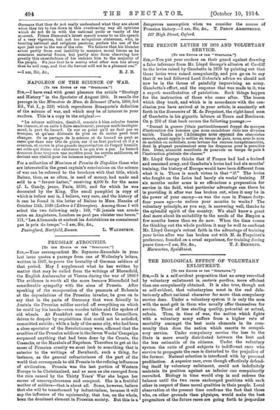THE FRENCH LEVIES IN 1870 AND VOLUNTARY SERVICE.
[TO THE EDITOR OF THE " SPECTATOR.n
SIR,—You put your readers on their guard against drawing a false inference from Mr. Lloyd George's allusion at Cardiff to the levies raised by Gambetta in 1870 by pointing out that those levies were raised compulsorily, and you go on to say that if we had followed Lord Iloberts's advice we should not now be in the throes of painfully improvising an army. Gambetta's effort, and the response that was made to it, was a superb manifestation of patriotism. Such things happen
for the instruction of those who come after. The lesson which they teach, and which is in accordance with the con- clusion you have arrived at in your article, is succinctly set forth in the Souvenirs of M. de Freycinet, the right-hand man of Gambetta in his gigantic labours at Tours and Bordeaux. On p. 250 of that book occurs the following passage :—
"Durant la gueste fetais particulierement frappe du mantises d'instruction des hommes quo nous encadrions dans nos diverses unites. Tandis que l'Allemagne nous opposait des reservistes exerces, ayant appris le métier en temps de pair, nous, sous le nom de mobiles ou mobilises, nous levions des recrues inexperimentees, dont Is. plupart paraissaient sous les drapeaux pour is premiere fois. Done, necessite manifeste de pourvoir en temps de pair a rinstruction generale des classes."
Mr. Lloyd George thinks that if France had had a trained and seasoned army, and Gambetta's levies had had six months' training, the history of Europe would have been different from what it is. There is much virtue in that "if." The levies who fought on the Loire had barely six weeks' training. If
six months under arms is so efficacious a preparation for service in the field, what particular advantage can there be in providing it after war has broken out, when it may be in the power of your enemy—as was the case in France forty-
four years ago—to reduce your months to weeks The voluntary principle, as you say, is answering well, thanks to the splendid spirit of the country. We shall know a great deal more about its suitability to the needs of the Empire a few months hence than we do now. When the time comes for thinking out the whole problem it may be well to confront Mr. Lloyd George's robust faith in the advantage of training your levies after war has broken out with M. de Freycinet's preference, founded on a cruel experience, for training during


































 Previous page
Previous page